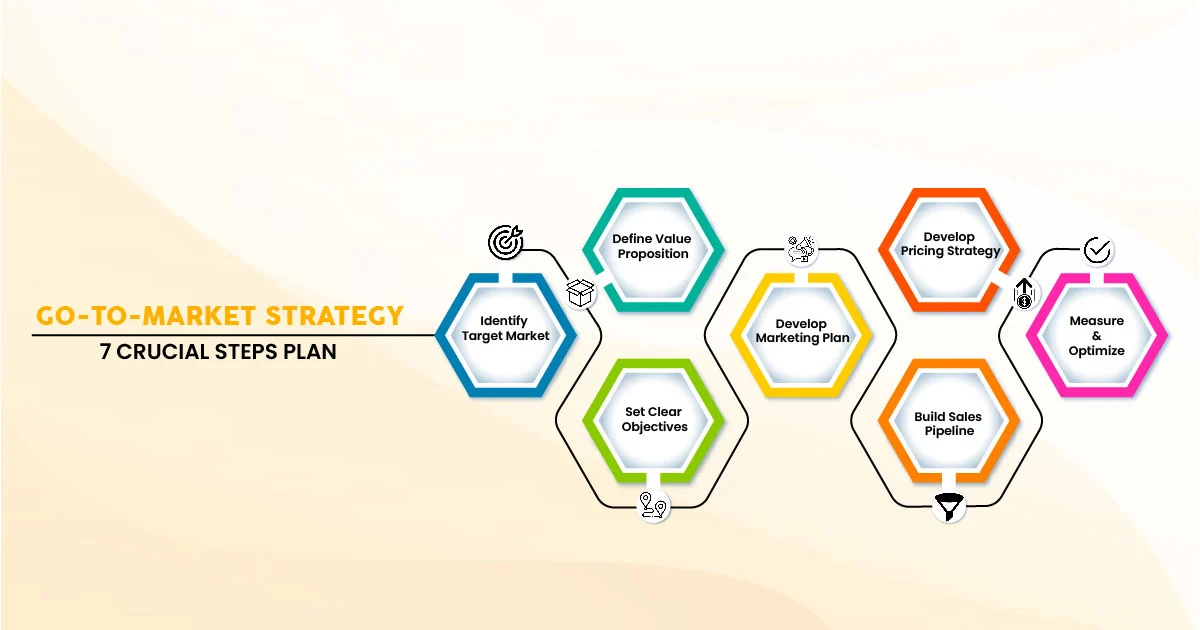

Go-to-Market Strategy: 7 Crucial Steps for Success
The success of any product or service greatly relies on an effective go-to-market strategy. It involves carefully planning and executing various steps to ensure your offering reaches the right audience, generates demand, and drives sales. In this article, we will explore seven crucial steps that can help you craft a winning go-to-market strategy.
- Define Your Target Market: Understanding your target market is fundamental to a successful go-to-market strategy. Identify your ideal customer profile, including demographics, psychographics, and pain points. Conduct thorough market research to gain insights into customer needs, preferences, and buying behaviours. This knowledge will enable you to tailor your marketing messages and reach the right audience.

- Craft a Compelling Value Proposition: A strong value proposition is essential for capturing the attention of your target market. Clearly articulate the unique benefits and advantages your product or service offers compared to competitors. Highlight the value it brings to customers and address their pain points. A compelling value proposition will differentiate your offering and attract potential customers.

- Develop a Market Entry Plan: Create a comprehensive plan outlining how you will enter the market. Consider factors such as pricing, distribution channels, promotional strategies, and partnerships. Determine the most effective channels to reach your target audience, whether it’s through online advertising, social media, content marketing, or traditional marketing methods. Tailor your plan to the specific needs of your product or service.

- Build a Strong Brand: Your brand plays a crucial role in establishing trust and credibility in the marketplace. Develop a strong brand identity that resonates with your target audience. Create a memorable brand logo, tagline, and visual elements that represent your values and differentiate you from competitors. Consistently communicate your brand’s message across all touchpoints to build recognition and loyalty.

- Develop a Sales and Marketing Strategy: A well-defined sales and marketing strategy is vital for driving demand and achieving sales targets. Determine the most effective channels and tactics to reach your target market. Leverage digital marketing techniques like search engine optimization (SEO), pay-per-click (PPC) advertising, and social media marketing. Additionally, consider traditional methods such as trade shows, direct mail, and industry partnerships. Continuously measure and optimize your marketing efforts to maximize results.

- Enable Your Sales Team: Equip your sales team with the tools and training they need to effectively sell your product or service. Provide in-depth product knowledge, sales scripts, and sales collateral. Implement a robust customer relationship management (CRM) system to track leads, manage customer interactions, and analyze sales data. Regularly communicate with your sales team to ensure alignment and address any challenges they may encounter.

- Monitor and Evaluate: Continuous monitoring and evaluation of your go-to-market strategy are crucial to its success. Regularly assess key performance indicators (KPIs) such as sales revenue, customer acquisition costs, customer satisfaction, and market share. Identify areas of improvement and adjust your strategy accordingly. Stay agile and adapt to changing market dynamics and customer needs.

Conclusion
Crafting a successful go-to-market strategy requires careful planning, creativity, and a deep understanding of your target market. By following these seven crucial steps, you can position your product or service for success in the marketplace. A well-executed strategy is a key driver of growth, customer acquisition, and overall business success.
